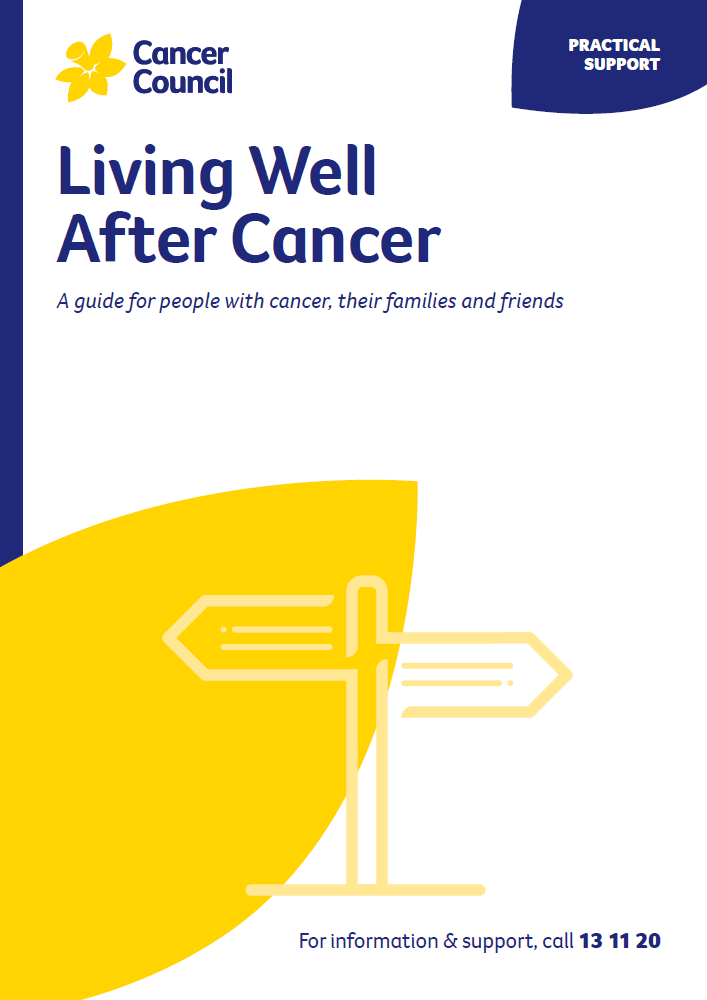- Home
- About Cancer
- Cancer treatment
- Radiation therapy
- Life after radiation therapy
Life after radiation therapy
For most people, the cancer experience doesn’t end on the last day of radiation therapy. Radiation therapy usually does not have an immediate effect, and it could take days, weeks or months to see any change in the cancer. The cancer cells may keep dying for weeks or months after the end of treatment. It may be some time before you know whether the radiation therapy has controlled the cancer.
Learn more about:
What happens after treatment finishes?
After radiation therapy has finished, your treatment team will tell you how to look after the treatment area and recommend ways to manage side effects. They will also advise who to call if you have any concerns.
Life after cancer treatment can present its own challenges. You may have mixed feelings when treatment ends, and worry that every ache and pain means the cancer is coming back.
Some people say that they feel pressure to return to “normal life”. It is important to allow yourself time to adjust to the physical and emotional changes, and establish a new daily routine at your own pace. Your family and friends may also need time to adjust.
Cancer Council 13 11 20 can help you connect with other people who have had cancer, and provide you with information about the emotional and practical aspects of living well after cancer.
For more on this, see Living well after cancer.
Follow-up appointments
After treatment finishes, you will have regular check-ups to see how the cancer has responded to treatment. This may be in person at the treatment centre or using telehealth. You may see the radiation oncologist, your GP or another specialist, depending on where you live and what the treatment team recommends. Check-ups will become less frequent over time.
You may also have follow-up appointments with nurses from your treatment centre to help manage any ongoing symptoms, as well as regular check-ups with other specialists who have been involved in your treatment.
When a follow-up appointment or test is approaching, many people find that they think more about the cancer and may feel anxious. Talk to your treatment team or call Cancer Council 13 11 20 if you are finding it hard to manage this anxiety.
Let your treatment team know immediately if you have any health problems between follow-up appointments. Many of the long-term or late effects of radiation therapy can be managed better if found early.
Dealing with feelings of sadness
If you have continued feelings of sadness, have trouble getting up in the morning or have lost motivation to do things that previously gave you pleasure, you may be experiencing depression. This is quite common among people who have had cancer.
Talk to your GP, as counselling or medication – even for a short time – may help. Some people can get a Medicare rebate for sessions with a psychologist. Ask your doctor if you are eligible. Cancer Council may also run a counselling program in your area.
For information about coping with depression and anxiety, call Beyond Blue on 1300 22 46 36. For 24-hour crisis support, call Lifeline on 13 11 14.
→ READ MORE: Personal stories from people who have had radiation therapy
Watch this video to see why eating well is so important after a cancer diagnosis, and what you can do to maintain a healthy diet.
Research shows that exercise benefits people with cancer during and after treatment. Find out more in this video or see our other exercise videos.
More resources
A/Prof Susan Carroll, Senior Staff Specialist, Radiation Oncology, Royal North Shore Hospital, and The University of Sydney, NSW; Katie Benton, Advanced Dietitian Oncology, Sunshine Coast Hospital and Health Service, QLD; Adrian Gibbs, Director of Physics, Radiation Oncology, Princess Alexandra Hospital Raymond Terrace, QLD; Sinead Hanley, Consumer; Dr Annie Ho, Radiation Oncologist, GenesisCare, Macquarie University Hospital and St Vincent’s Hospital, NSW; Angelo Katsilis, Clinical Manager Radiation Therapist, Department of Radiation Oncology, Royal Adelaide Hospital, SA; Candice Kwet-On, 13 11 20 Consultant, Cancer Council Victoria; Jasmine Nguyen, Radiation Therapist, GenesisCare Hollywood, WA; Graham Rees, Consumer; Nicole Shackleton, Radiation Therapist, GenesisCare Murdoch, WA; Dr Tom Shakespeare, Director, Cancer Services, Mid North Coast Local Health District, NSW; Gabrielle Vigar, Nurse Lead, Cancer Program, Royal Adelaide Hospital and Queen Elizabeth Hospital, SA.
View the Cancer Council NSW editorial policy.
View all publications or call 13 11 20 for free printed copies.

